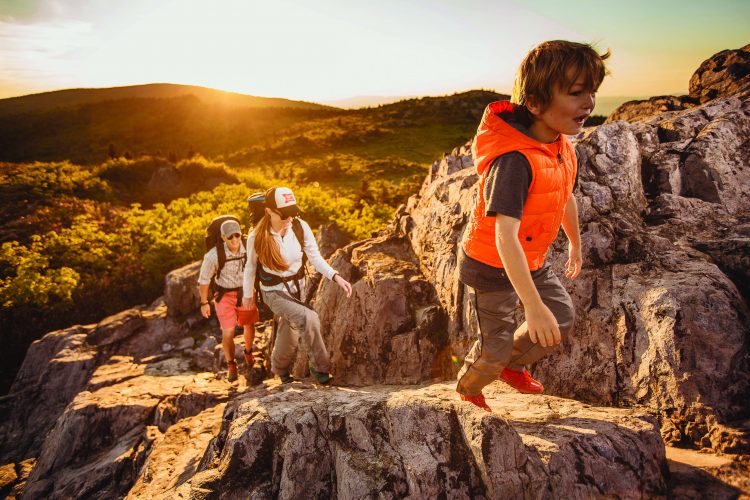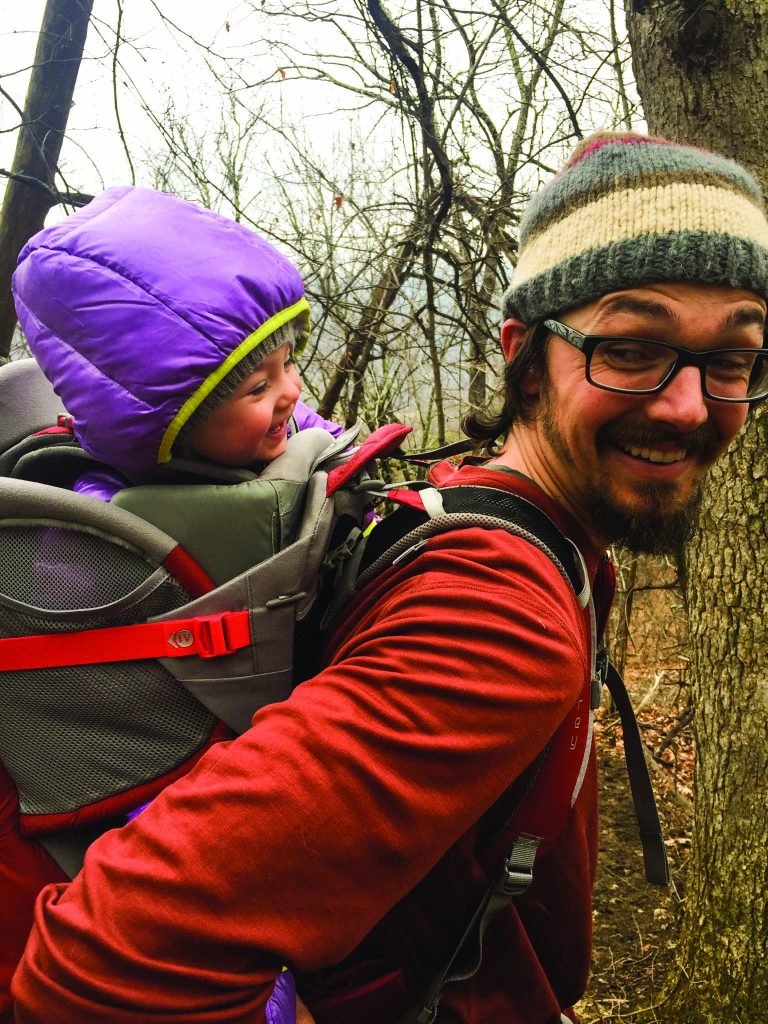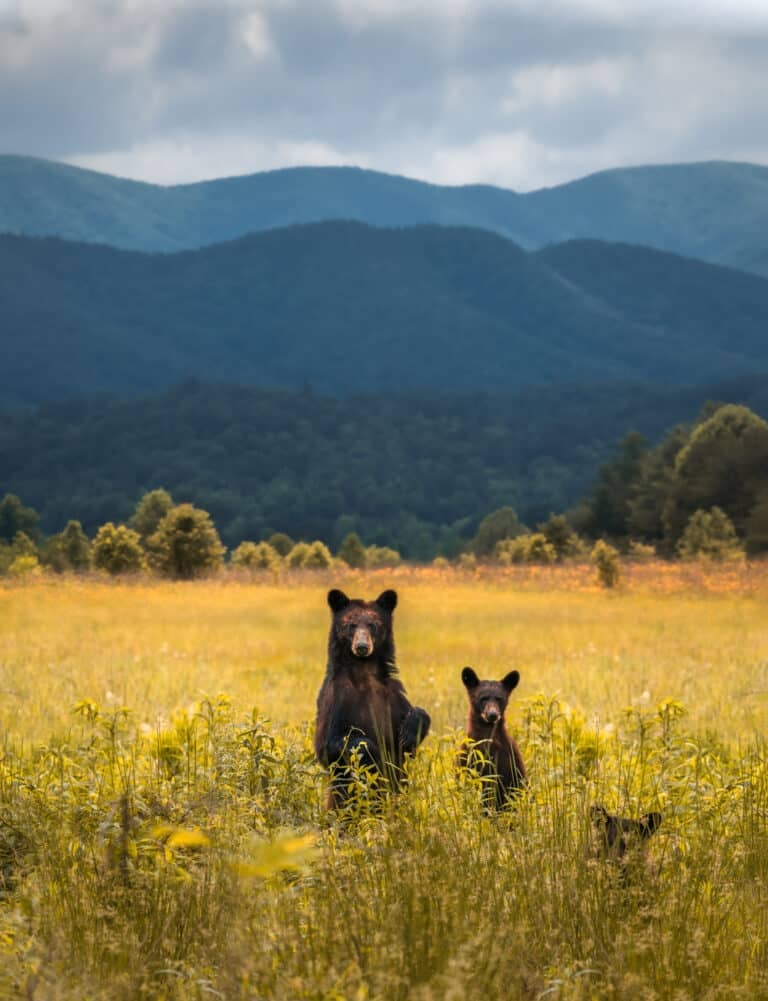Once upon a time, parents weren’t parents. They were 20-something-year-olds with heads full of dreams, time and energy in spades. They did more than change diapers and watch Sponge Bob. For these five Blue Ridge families in particular, life before kids was measured in athletic benchmarks—podiums won, miles traveled, adventures undertaken.
Yet even now, these parents aren’t just parents. They’re entrepreneurs and business professionals and mentors, yes, but they’re still athletes. They’re still training and racing and exploring, which begs the question—can you be an accomplished athlete and a first-rate parent too?
Mommy Guilt
Sophie Carpenter Speidel of Charlottesville, Va., wasn’t always a runner. In college, running was a means to an end, a way to stay in shape for her lacrosse career, which eventually landed her on the US Women’s National Lacrosse Team from 1982 until 1984. So in 2005, when Speidel was toeing the line at the Massanutten Mountain Trails 100 Mile, her first 100-miler, just three years after her first ultra ever, no one was more surprised than she.
“I had run the 10K at the Blue Ridge Burn for a few years and I loved it,” she says of her early trail running experiences. “I was set free, it seemed like.”
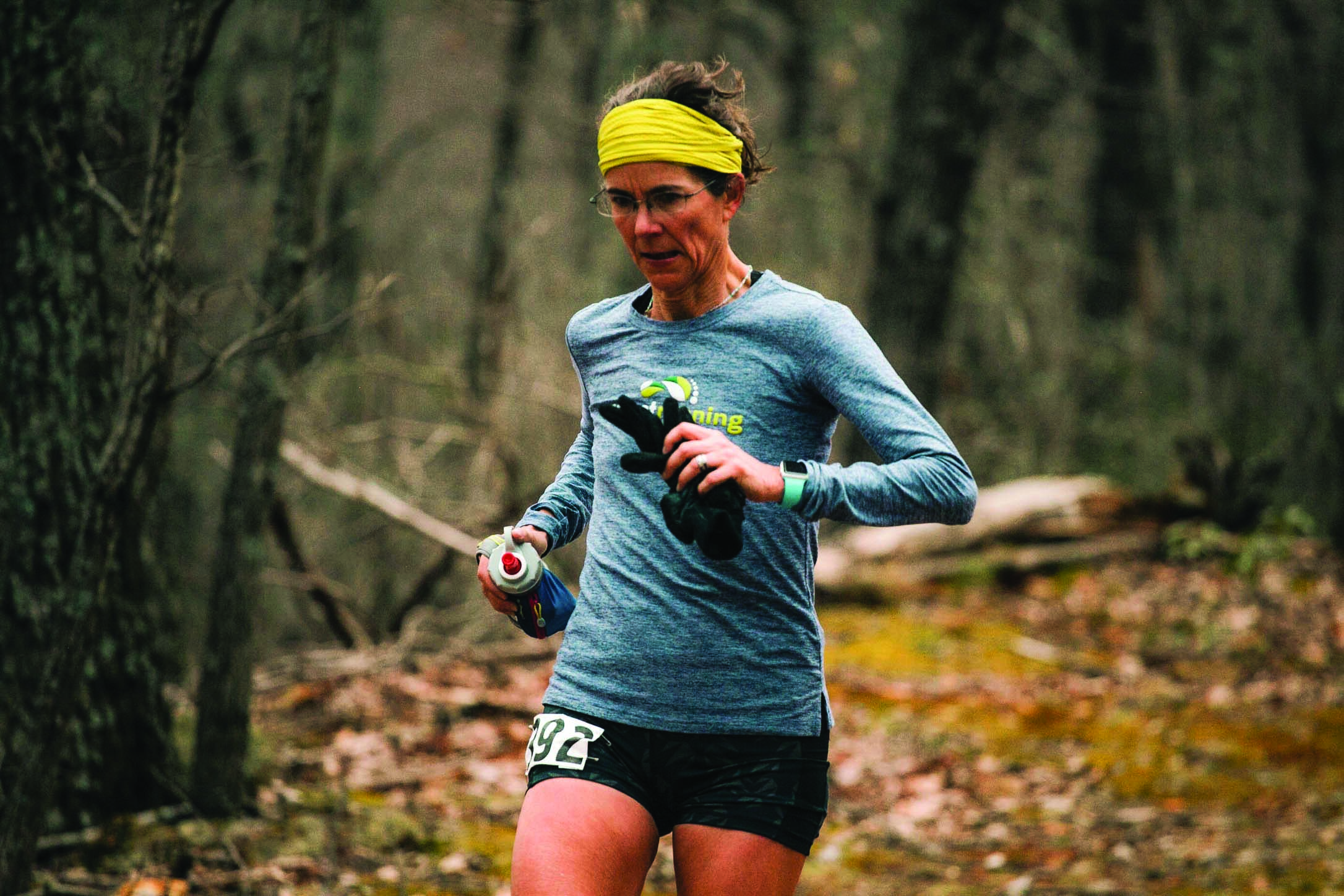
But an ultra, let alone a 100-miler, is a far cry from a 10K, as Speidel quickly found out. Especially when it comes to training while trying to raise three kids under the age of 10. Knowing little about proper training tactics for a 100-miler, Speidel was in the woods all day, every day, every weekend. When she wasn’t running, she was reading about running. Running consumed her, exhausted her, but it also exhilarated her.“Ultra running can be very seductive, like any endurance sport, in terms of time and community,” she says. “It’s a great escape, especially in this day and age, to just be in the mountains all day. You can lose track of the reality of your life a little bit. Some people realize that and right the ship,” but often, as was the case with Speidel, there needs to be a catalyst first, a looming threat of capsizing, to change the trajectory.
For Speidel, that moment came at the Bull Run 50 Mile in Clifton, Va. It was a beautiful, crisp morning. Speidel was making quick work of the course, moving with ease through rolling woods and across spring fed creeks. Speidel was in the zone, lost in her breath and the sounds of birds in the trees and leaves crunching underfoot. But almost halfway through the race, the course spit her out from the forest and back into the bustle of Clifton. And that’s when she saw it—a soccer field.
“It was a typical Saturday morning in northern Virginia,” she says. “The course literally runs through this soccer field and as I’m running through, I’m looking around and seeing all of these families with kids. That race gave me huge mommy guilt. It’s unlike when you go out in the mountains and you’re away from it all.”
Though her husband Rusty had mostly supported Speidel’s newfound obsession with running, it was starting to wear on their marriage. Even when Speidel was home, she was distracted, preoccupied with race reports and training methods. But after the Bull Run 50 Mile, Speidel came to grips with reality and made a change.
“Your kids are only young once. If it doesn’t work, it doesn’t work and there will be plenty of time to do your thing later,” she says. “You gotta figure out what works for your family. Balance is a matter of trial and error.”
Eventually, the couple fell into a rhythm of taking turns. Speidel ran on Saturdays and Rusty biked on Sundays. She continued running ultras, averaging about seven per year, all the while supporting Rusty and his goals, like finishing the Shenandoah Mountain 100. And when the kids were old enough to compete in organized sports of their own, Speidel prioritized that first, even if it meant missing out on her favorite races.
“Throughout the parenting continuum, I’ve ebbed and flowed. I went from being gung-ho in the beginning, got a reality check, and now I have perspective. I missed out on years of races, but I didn’t mind. If you do mind, then something’s wrong.”
[nextpage title=”Next Page”]
Work Hard to Play Hard
For triathlete Jay Curwen of Asheville, N.C., the reality check he needed came not from his wife Monica but from their first-born son. Curwen, who’s been a two-time USA World Triathlon Championship Team Member and National Champion adventure racer, knew that his athletic expectations would need some adjusting when kids came into the picture. But shifting his career, which at the time was working as a sales representative for Patagonia, was one change he didn’t expect to make.
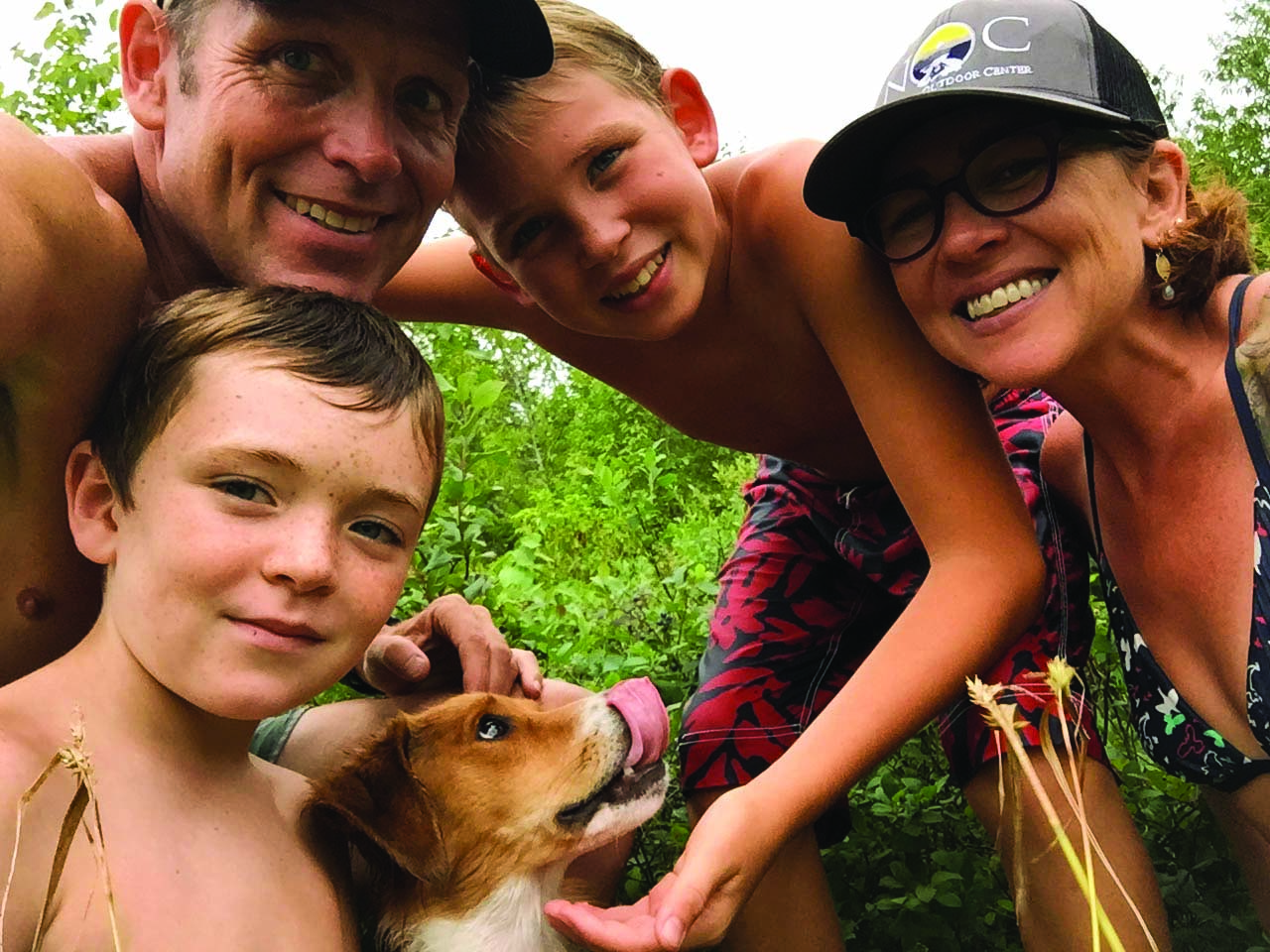
“My oldest was just a couple years old at that point, and in his memory, I was gone as much as six months at a time,” Curwen remembers. “That wasn’t the case. I was sometimes gone two weeks at a time, but that broke my heart because in his three-year-old mind, I was gone half a year.”
Curwen ditched the traveling gig and found a job with the Nantahala Outdoor Center, which meant he could be present at home with his three sons while still being an active part of the Southeast’s outdoor industry. As for fitness, Curwen exercises whenever he can, even if it means answering work emails while cranking out miles on a stationary bike.
“Up until Monica and I got married, athletics for me was all-consuming. Basically every part of my life I geared towards being an athlete and getting faster,” he says. “When I was 25, I didn’t leave anything to chance. If the guy beat me, it was because he was legitimately better than me. Now, if I win, I win, if I don’t, I don’t and it’s okay. I don’t pressure myself on the results anymore.”
Don’t let Curwen fool you—his competitive fire hasn’t totally gone to ash. Just last year, Curwen won his age division at both the USA Triathlon Off-Road National Champions and the USA Triathlon Long Course Duathlon National Champions. The trick to staying moderately competitive while still being a present, engaged father, he says, is a combination of maintaining a base level of fitness, getting up early, and including the kids.
“My boys have definitely seen their dad get his clock cleaned more times than not,” says Jay Curwen. “They’ve also seen me win a lot of things and, as a five-year-old, if you see nothing but your dad win, that becomes your expectation. I don’t want that to be any kind of example. I want them to be able to enjoy competing and not competing and not measure themselves against any other yardstick but themselves.”
Training Smarter
“Instead of training for triathlons, I stuck to running because it was something I could do while pushing them in the stroller,” says 37-year-old Sue Finney of Knoxville, Tenn.
Finney is a wife and mother of three. Last September, she and her husband David opened their own gym, KyBRa Athletics. As if balancing all of that wasn’t enough, Sue also managed to recover from a broken foot and swipe the title as the 2016 XTERRA Southeast Regional Champion. Like Curwen, Sue knows she has to be realistic about how much time she can spend training for the upcoming XTERRA World Championships this year, but that’s all the more reason to make the most of what little time she does have.
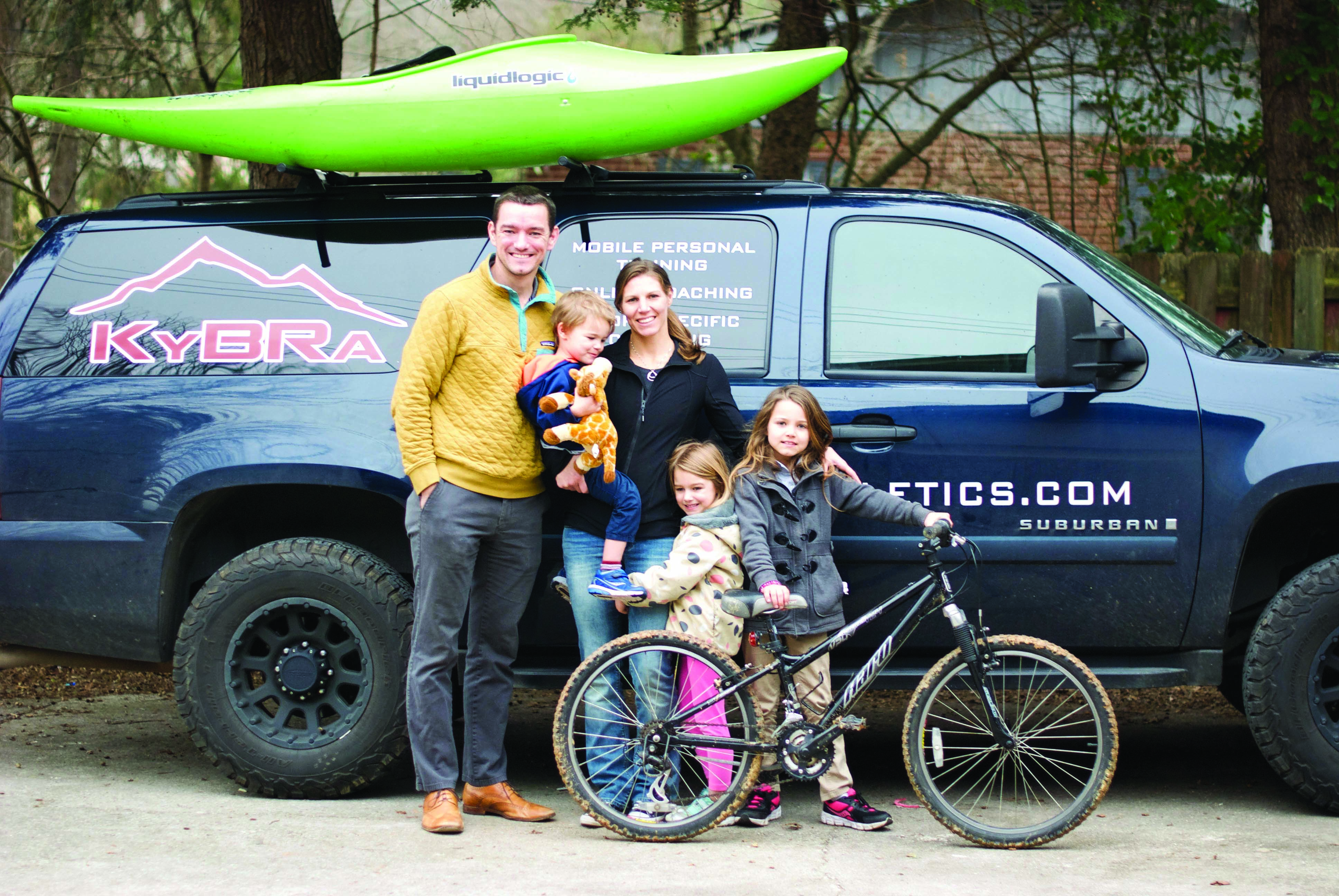
“You really don’t have time for lazy downtime,” she says of being a gym owner, mom, and athlete-in-training. “I train so much better now than I did in my 20s. Then, I would say, I just want to ride for fun today and I’ll work hard tomorrow, but now, I don’t know if I’ll have a tomorrow. What if a kid gets sick or there’s a snow day? I might train a little less, but I’m actually doing better. If I had my 20-year-old body with my 37-year-old mindset, I’d be a lot better of an athlete.”
“Having kids really makes you live up to your potential,” adds her husband, David. “They also teach you to be more flexible and just a little more dynamic in how you live your life.”
For David, that meant giving up the high-consequence stakes of steep creek, expedition-style kayaking that had defined his years as a member of the Riot Team. In his 20s, David’s life looked a lot like a spread in Rapid Magazine—pristine waterfalls, dense jungle canopy, shuttle rides on the back of mud-encrusted motorcycles. Every year, David would spend multiple months on whitewater trips in exotic destinations ranging from Thailand to Patagonia. David still paddles on the Southeast classics, but he’s more interested now in teaching his kids to paddle and introducing them to the element that has so influenced his life.
“I don’t do a lot of things I would have done 20 years ago because if I got hurt or drowned, it would affect many more people than it would have when I was 20 years old and single,” he says. “You assess risk differently. It becomes less valuable to you to paddle the hardest rapids or go over the tallest waterfalls. Your kids don’t care. They just like to think you’re kayaking.”
And more importantly, he says, they like to be a part of it. Holidays at the Finney household don’t involve a lot of gifts. Birthdays in particular, says Sue, are structured around experiences over material items. Their oldest, Kyra, 7, chose paddling the Nantahala for her birthday, and their middle child, Rachel, 4, wanted to go camping. Kyra recently got her very own mountain bike, and is anxiously waiting for the junior race season to begin. It’s moments like these, agree Sue and David, that make all of the hard work and dawn patrols worth it.
“We get up early at 5 a.m., we don’t watch a lot of TV, or if we do we fall asleep to it, date nights aren’t usually movie-and-a-dinner but hire-a-babysitter-so-we-can-mountain-bike-together,” says Sue, “but if you can just make the kids part of it all, they’re happier. I hope I’m still racing when my kids are in high school, but I also hope that they’re out there kicking my butt.”
[nextpage title=”Next Page”]
No Excuses
That philosophy of inclusion is sweeping the parenting world, particularly in younger generations of moms and dads. Just ask Blacksburg, Va., parents Luke Hopkins and Anne Pagano. You need only take a look at their Instagram feeds (@adventures_of_annie and @localpaddler) to see that athletically driven parents can have their cake and eat it, too.
“You can still do everything you did before having kids, but there’s no question that things change to some degree or another,” says Pagano, “but they make baby backpacks for hiking, strollers for running, you can have a baby sit between your legs in a kayak and paddle on flatwater. It’s not easy, but there’s always a way.”
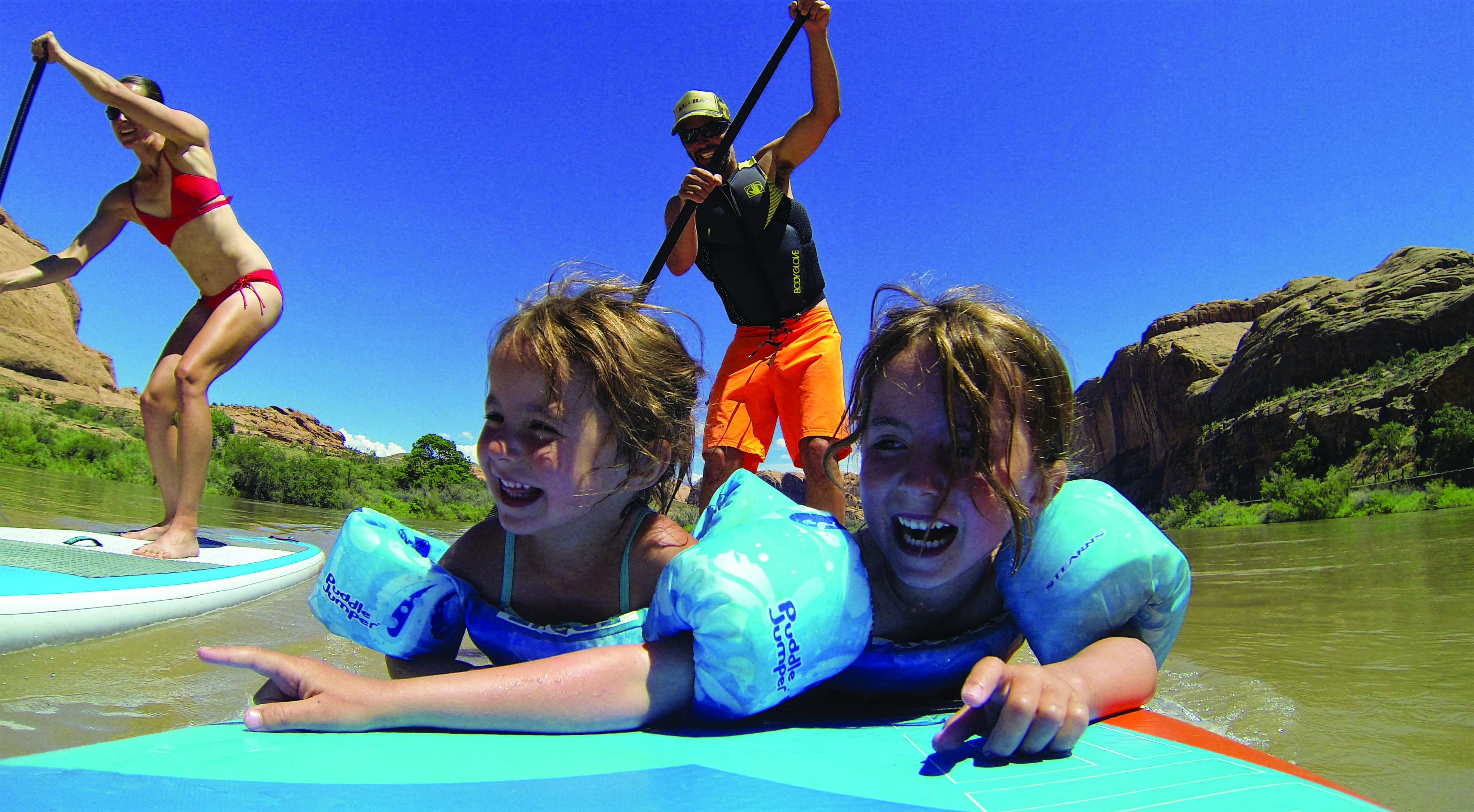
Hopkins, who grew up competitively kayaking and earned the podium twice at the US Freestyle World Championships (silver in 2001, bronze in 2003), and Pagano are leading the charge in the Southeast’s standup paddleboard scene. They’re regular contenders in regional SUP races like the Chattajack 31, the New River Gorge SUP Race, and the Tuck Fest SUP Cross. Hopkins works as sales manager for Onewheel, while Pagano is brand ambassador for Body Glove, Imagine Surf, Accent Paddles, and IceMule Coolers. The couple also stays busy hosting the destination SUP TV series Chasing Waves.
“Having kids, for me, hasn’t really stopped my professional athlete career,” says Hopkins. “It’s not the, ‘I can’t,’ or, ‘I never,’ or, ‘Everything’s just changed,’ it’s the, ‘How can?’ attitude that’s made it possible for us to live the outdoor recreational lifestyle, still travel, and still make a living to support our family.”
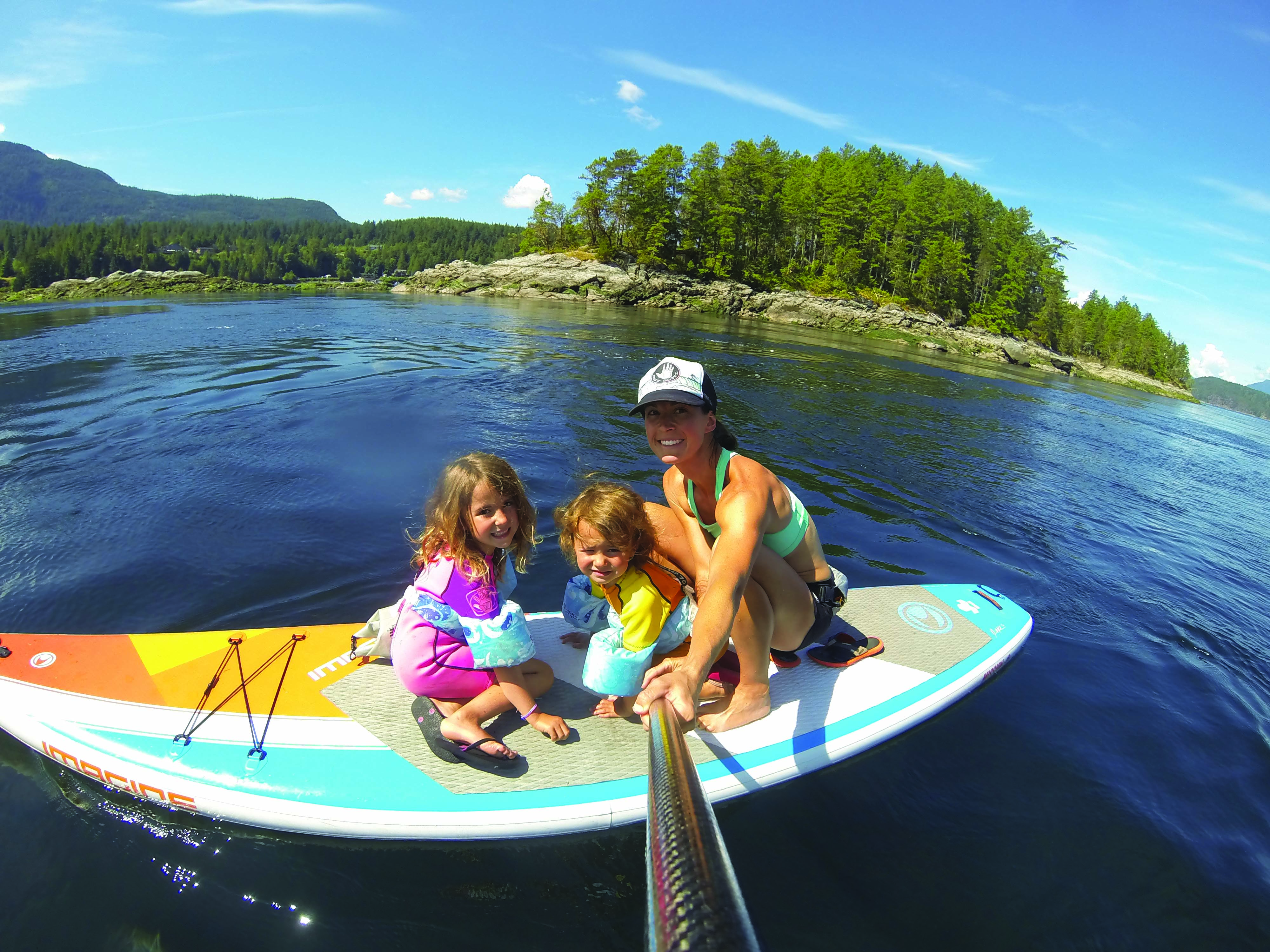
Their seemingly progressive parenting style is a mix between the skin-your-knee mentality on which many of us were raised and the summer camp pillars of trying hard and having fun. While the fall and winter months are pretty standard as far as most families go, summer months for their two girls, ages eight and five, are anything but. For the past three years, the family has lived on the road out of an RV for the summer, traveling, exploring, and for Hopkins, working at a dozen outdoor industry events.
At the very least, their girls have a childhood full of experiences most adults can only dream of—paddling the Allagash River in Maine, exploring and paddling on the Skookumchuk in British Columbia, paddling the Salmon River and soaking in Idaho’s hot springs, hiking in Arches National Park, paddling Oregon’s Columbia River Gorge…you get the picture.
“Everything is definitely slower which wasn’t something I was used to,” says Pagano. “When I hike, I typically hike fast or run, but they have taught me to look around and collect acorns, find mushrooms, find the little frogs I wouldn’t see if I was running through the woods on my own. I have definitely learned to appreciate slowing down, savoring, and taking our time.”
Cultivating Grit
The relationship with time is ultimately what made Roanoke-based parents Bekah and Derrick Quirin decide to take their one-year-old baby Ellie on a thru hike of the Appalachian Trail. The Quirins, who are both 25, have always wanted to thru hike the trail. After graduating from college with degrees in outdoor leadership, they thought for sure they would hike the trail, but they got jobs, traveled out west, and then Bekah became pregnant.
“I left my job to stay home with Ellie and joined this hiking group called Hike It Baby,” says Bekah. “One day, I realized that it might be a possibility [to thru hike with her] because Ellie was a lot happier being outside than inside. She loves the outdoors.”
BRO-TV: Ellie on the AT from Blue Ridge Outdoors on Vimeo.
After months of planning and deliberation, the Quirins set off on their flip-flop journey from Roanoke last month, with plans to hike south first to Springer Mountain before heading north to hike from Katahdin back to Roanoke. Their plan seems ambitious, maybe a little too ambitious to some—Ellie, who Bekah will be solely responsible for carrying while Derrick lugs the rest of their gear, will be going through her teething phase on the trail. But for both Bekah and Derrick, the benefits of spending all day, every day with Ellie during those eight allotted months far outweigh the challenges of hiking 12 miles a day with heavy packs.
“Everybody says, ‘time flies,’ and then when you have kids, time flies even faster. We didn’t realize how true that was. When we thought about how we can make time slow down, that’s how we came to thru hiking,” says Bekah. “I’m sure I’ll definitely question at some point what in the world were we thinking taking this trip, but mentally, I want to have the perspective that even if we were still in our comfortable house with everything that is normal to most people, there are still going to be rough days. Doing a thru hike is hard, but raising a child in general is really hard, too.”
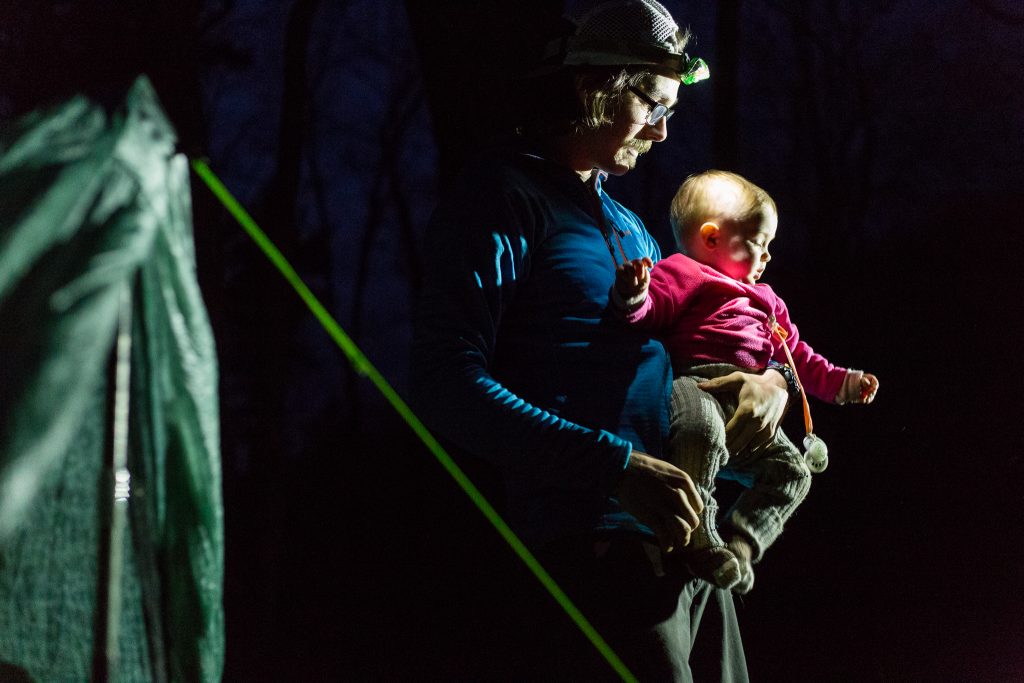
Before you go judging the Quirins or Pagano-Hopkins household for raising van-lifer-dirtbags-in-the-making, recent studies show that the introduction of grit into a child’s life is more important to overall success than natural intellect or talent. According to Angela Lee Duckworth, a University of Pennsylvania psychologist who has studied grit for decades, instilling children with optimism at the first signs of discomfort, or failure, can make them more successful down the road.
“Grit is living life like it’s a marathon, not a sprint,” says Duckworth in her TED Talk on grit. “It’s about having stamina, sticking with your future—day in, day out, not just for the week, not just for the month, but for years—and working really hard to make that future a reality.”
Sounds like a thru hike, doesn’t it? While baby Ellie will likely only remember her white blaze trek in pictures, that exposure to her parents working hard, and possibly failing, will have a lasting effect on her grittiness.
[nextpage title=”Next Page”]
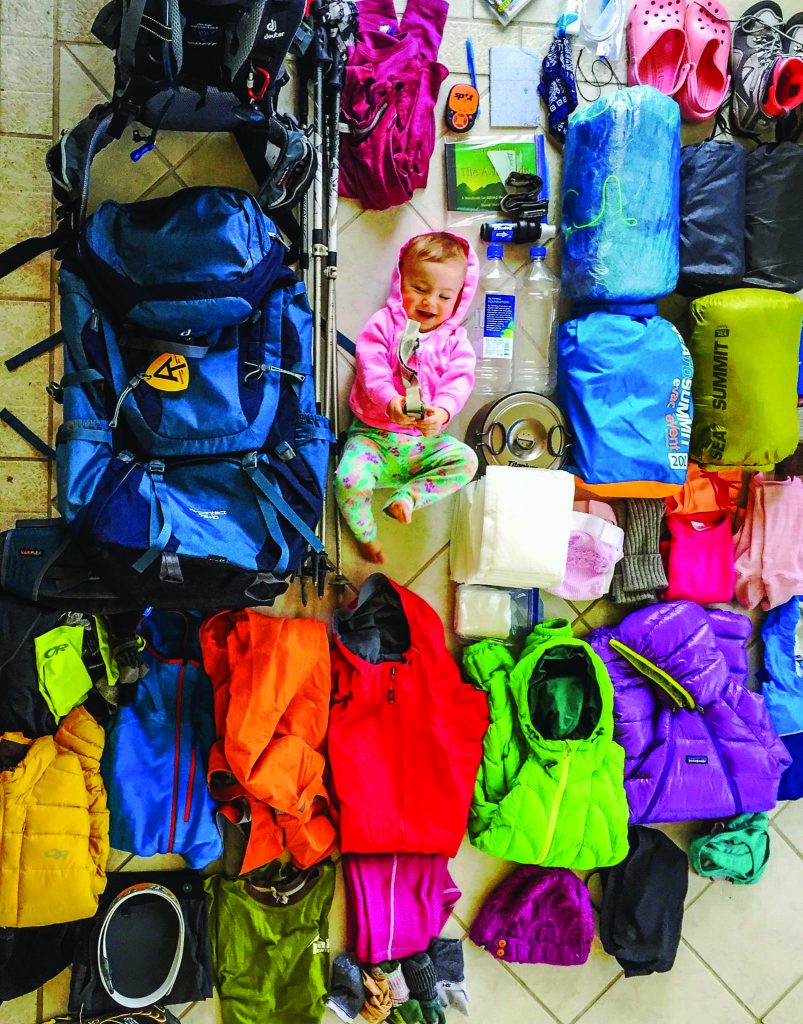 Words of Wisdom
Words of Wisdom
Want to take the kids on your next outdoor adventure? Take a gander at these tried and true tips from our four families before you hit the trail.
Start ‘em young!
“When we moved to Charlottesville, to be honest with you, I didn’t even know about the Appalachian Trail. Later we tried taking them to Old Rag, but unless you really start them young, it’s hard.”
—Sophie Carpenter + Rusty Speidel
Keep it fun.
“As adults, we really don’t have too much trouble putting our head down and grinding out a workout, but when you’re 10 years old, that’s not what it’s about. It’s about having fun, and adults sometimes skip the fun part.”
—Jay + Monica Curwen
Bring more food always.
“Pack more food than you think. Exploring the outdoors takes a lot out of not only the kiddos, but the parents. ‘Hangry’ family members can ruin a day in the woods.”
—David + Sue Finney
Keep it short and sweet.
“Keep the length of your trip age appropriate. Younger kids tend to have shorter attention spans.”
—Anne Pagano + Luke Hopkins
Give yourself a break.
“There are educators in the field that can do the job of teaching your kid things, whether it’s a ski instructor or paddling instructor, and I would encourage parents to lean on that resource rather than be the instructor yourself. I’ve seen my kids take the same advice and instruction I gave them from a professional because that instructor was not a parent. It’s money well spent.”
—Jay + Monica Curwen
Be prepared, but embrace spontaneity.
“When traveling, pack lunches and scout out state parks or national forest ahead of time and take back roads as often as possible. Some of our most memorable experiences are the places we stopped for a picnic lunch or a break from driving.”
—David + Sue Finney
Top 10 Destinations for Family Friendly Fun
Our four families shared their favorite places to go outside and play.
Play + Dine
Spy Rock + Devils Backbone Brewing Company
Roseland, Virginia
At 3.1 miles roundtrip, this short hike in central Virginia won’t take all day, but when you’re dragging kids up a mountain, shorter is sometimes better. The trail climbs steadily to the Spy Rock summit, but that means it’s all downhill from there. Spend an hour or two basking in the 360-degree views of the Religious Range before heading back for a lunch or early dinner at Devils Backbone Brewing Company. When the weather’s nice, the outside seating and game area gives kids plenty of room to roam while the adults kick back by the fire pit with a locally crafted brew.
Turk Mountain + Blue Mountain Brewery
Afton, Virginia
What better way to greet the day than a 2.2-mile morning hike to the top of a mountain? You’ll climb 690 feet to reach the peak, but once you’re there, you’ll be greeted with talus slopes to scramble on and classic Virginia Blue Ridge views to soak in. Head back down for brunch at Blue Mountain Brewery, which usually has live music on Sundays during the warmer months.
French Broad + Salvage Station
Asheville, North Carolina
Want a carefree, scenic river float that requires minimal logistics? Head out on the class I-II section of the French Broad River. In the summertime especially, this portion of the French Broad can become crowded with weekend tubers. Start your float early and take out at the Salvage Station. This riverfront bar, concert, and event space is more outdoors than in, and regularly has free music, games, and rotating food trucks.
Hit the Water
Nantahala Outdoor Center
Bryson City, North Carolina
Nothing says summer like whitewater rafting. Take a guided trip down the class II+ Nantahala River with one of the center’s seasoned guides. Kids can also enroll in one of the center’s various paddling schools or clinic offerings to take full advantage of the professional expertise here.
Fontana Lake
Almond, North Carolina
Rent a boat, or bring some floating crafts of your own, and head out onto this spectacular 10,000-acre lake. Engulfed by the majesty that is the Great Smoky Mountains, Fontana’s 240 miles of shoreline afford the adventurous at heart endless opportunities to explore. Quiet coves and defined cliff bands make great stopping points to cool off with a swim or cliff jump.
DuPont State Recreational Forest
Brevard, North Carolina
Hike or bike on DuPont’s 90-mile trail system. Situated at the heart of western North Carolina, this gem is easily accessible and can be as novice-friendly or as advanced as your family’s skillset allows. You would be remiss to plan an adventure here and not pay a visit to the waterfalls showcased in The Hunger Games. Given the stunning beauty of this North Carolina gem, even adults will find it hard not to channel their inner Katniss Everdeen.
Summersville Lake
Summersville, West Virginia
The sandstone cliffs that border Summersville Lake are out-of-this-world cool, whether you’re a pontoon floater, a SUPper, or a climber. Take your craft of choice to any number of boater access ramps and spend the day on this pristine body of water.
New River
Blacksburg, Virginia
Largely overshadowed by the rompin’ class IV-V New River Gorge downstream, the upper stretches of the New River are every bit as scenic and fun. Though the rapids are sizably smaller, they serve as the perfect whitewater introduction for kids of all ages. Put in at McCoy Falls just 15 minutes outside of Blacksburg. Skilled paddlers can get in a quick surf here before floating tranquilly down the rest of the class I-II run.
On Belay
Knoxville’s Urban Wilderness
Knoxville, Tennessee
Only a few miles from downtown Knoxville, this recreation oasis encompasses 1,000 acres across 10 different parks and four civil war sites. There are over 50 miles of multiuse trails here, making the Urban Wilderness a popular destination among cyclists and runners, but new to the scene is the Ijams Crag, Knoxville’s only outdoor climbing area. The climbing crag features a diverse range in beginner to advanced sport routes and affords novice climbers an intimidation-free environment to learn the ropes.
New River Gorge
Fayetteville, West Virginia
No matter if you climb sport, trad, or boulders, the bullet-hard sandstone at the New provides. Hike in for miles on stunning trails to avoid the crowds, or park-and-climb within minutes of leaving your car. Though the New is notorious for sandbagging, there are a handful of walls that offer more moderate routes for families and novice climbers, such as Sandstonia and Butcher’s Branch. Take care in the summer, as these areas in particular can become especially crowded on the weekends.
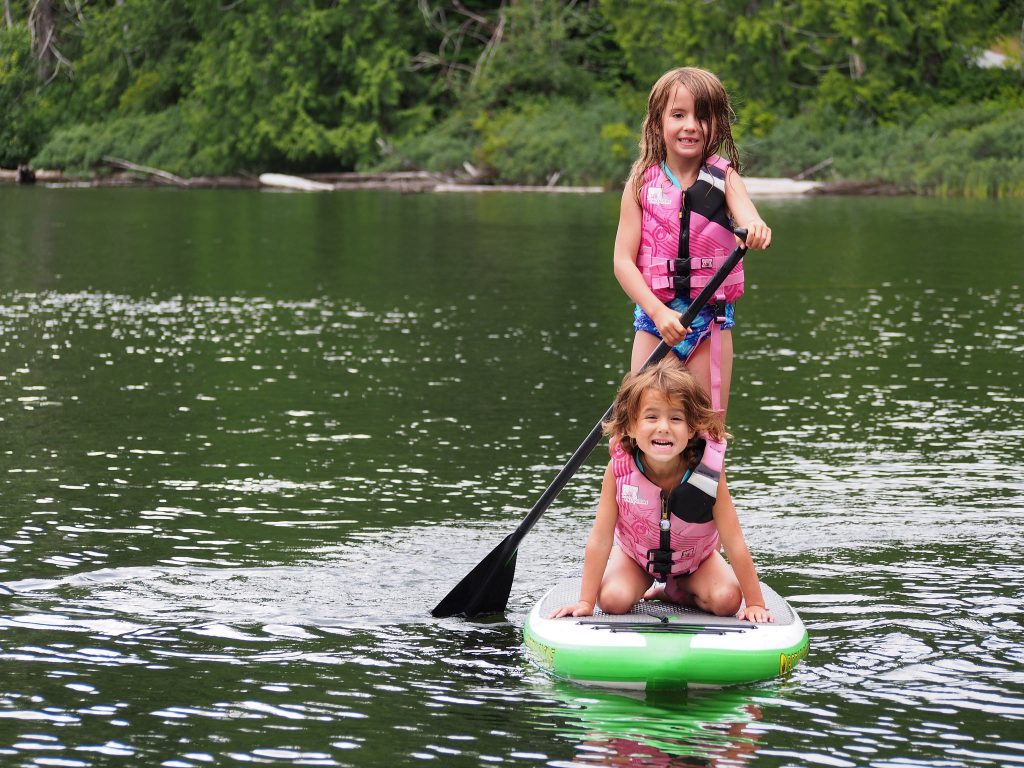
Get Schooled
With these 8 outdoor education centers so you, and your family, can feel safe about recreating.
Nantahala Outdoor Center
Bryson City, North Carolina
Voted “Best Raft Guide Company” in our 2017 Best of the Blue Ridge contest, the NOC is also one of the leading instructional centers for kayaking, swiftwater rescue, wilderness medicine, and, should you want to join the NOC raft guide ranks, raft guiding.
Landmark Learning
Sylva, North Carolina
For all things related to risk management, wilderness medicine, and backcountry response, Landmark Learning is the outdoor industry’s go-to educational organization. College students can even receive an entire semester’s worth of credits while gaining important industry certifications like Wilderness First Responder and Wilderness EMT.
Outward Bound
North Carolina, Georgia
No matter your age or experience level, Outward Bound has a course that will suit your needs. Trips can range from four days to almost three months and span all genres of outdoor adventure in every corner of the world, from sailing off the coast of Maine to backpacking in Patagonia.
Fox Mountain Guides
Pisgah Forest, North Carolina
Learn the ropes with Fox Mountain Guides, voted “Best Climbing Company” in our 2017 Best of the Blue Ridge contest and the only American Mountain Guides Association accredited guide service in the region. Beginners will gain a comprehensive understanding of rock climbing in an intimidation-free setting suited to their experience level, while even expert climbers will learn a thing or two from Fox Mountain’s seasoned guides.
Adventure Sports Center International
McHenry, Maryland
Touted as the world’s only mountaintop whitewater course, this manmade whitewater center is unique not only in its setting but its outstanding raft guides and kayak instructors. Learn the basics of whitewater paddling in a relatively controlled environment and without the logistical stress of paddling remote rivers.
New River Mountain Guides
Fayetteville, West Virginia
Want your teen to get hooked on something other than Facebook and video games? Send them to a weeklong rock climbing course this summer with New River Mountain Guides. Between the world-class climbing, nightly campfires, and lasting friendships, it’s sure to be a summer your child will never forget.
Wilderness Voyageurs
Ohiopyle, Pennsylvania
Make the most of your next weekend getaway with a two-day immersion in kayaking. For decades, the whitewater paddling hub of Ohiopyle has churned out some of the world’s best paddlers, so you know the boating here has to be good. All equipment and gear is provided as well as transportation and lunches on the water.
American Canoe Association
Various Locations
Throughout the year, the American Canoe Association partners with outfitters and paddling clubs across the country to offer a diverse array of courses such as swiftwater rescue, coastal kayaking, essentials of river kayaking, and SUP surf skills. Whether you’re a beach bum or a river rat, the ACA is your best bet for learning water safety and skills.
